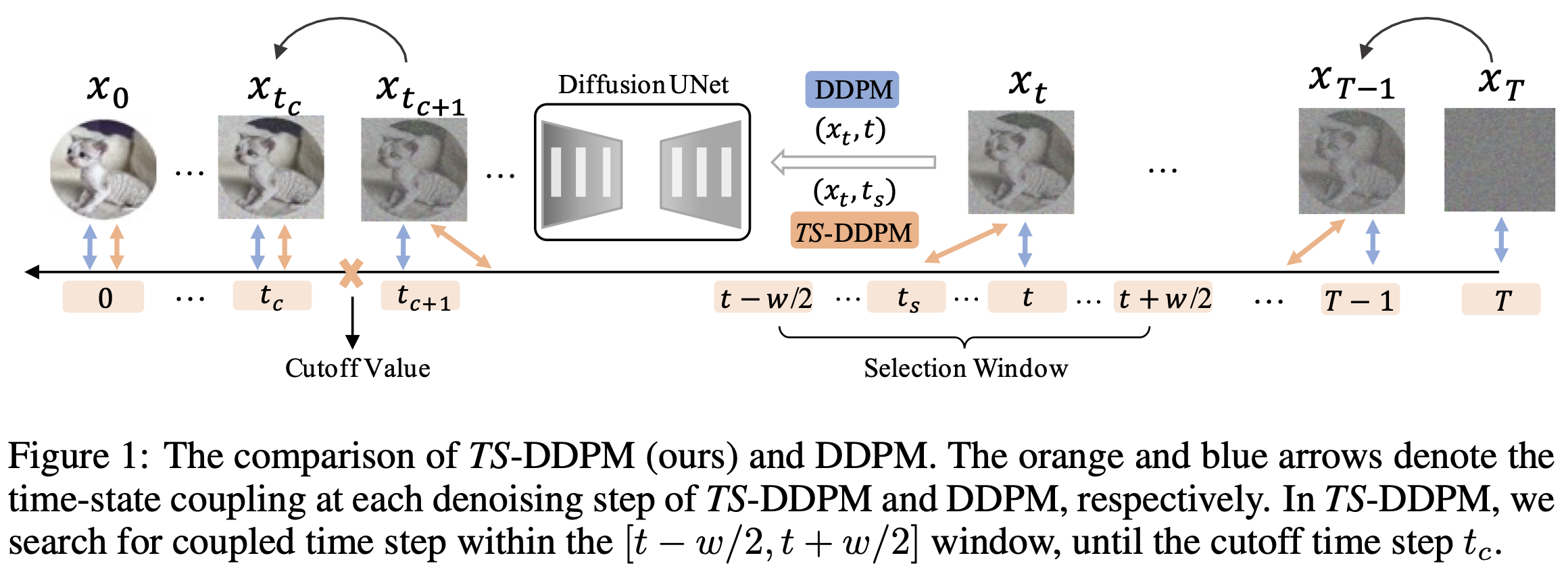This repo contains the official implementation for the paper Alleviating Exposure Bias in Diffusion Models through Sampling with Shifted Time Steps
by Mingxiao Li*, Tingyu Qu*, Ruicong Yao, Wei Sun, Marie-Francine Moens. International Conference on Representation Learning 2024 (ICLR'24).
This codebase comprises the integration of our TS-method with a wide array of popular diffusion samplers including DDIM, PNDM, DPM-Solver, and DEIS.
For the implementation of our method on ADM backbone, please visit this repo.
This code base also contains the implementation of ES-Samplers on original DPM backbone proposed in Elucidating The Exposure Bias in Diffusion Models(ICLR'24) by Mang Ning, Mingxiao Li, Jianlin Su, Albert Ali Salah, and Itir Onal Ertugrul . For the implementarions of ES-Samplers on ADM and EDM, please visit ADM-ES repo and EDM-ES repo.
git clone https://github.com/Mingxiao-Li/TS-DPM.git
cd TS-DPM
conda env create -f environment.yml
python run_generate.py
--config # the path to the config file (eg ./config/ddim-cifar10.yml), which contains the configurations of dataset and model
--model DDIM # by default, we use ddim
--model_path # the path to save pretrained model weights
--sampler # select diffusion samplers, in our implementation this could be pnm_solver, dpm-solver,or deis
--batch_size 512
--total_num_img 50000
--method # for pndm_solver, this args specify the oder of sovler,eg: f-pndm(4th order), s-pndm(2nd order) euler(1st order). For dpm-solver and deis, this arg does nothing.
--sample_speed # number of sampling steps
--dataset # which dataset (cifar, celeba, LSUN..)
--time-shift # if use TS algorithm
--window_size # specify the window size used in TS algorithm
--cut_off_value # specify the cut of value used in TS algorithm
Example of running F-PNDM (4th order) solver with TS using cifar-10 DDIM backbone:
python run_generate.py \
--config ddim_cifar10.yml \
--model DDIM \
--model_path /TS-DPM/models/ddim_cifar10.ckpt \
--sampler pnm_solver \
--batch_size 256 \
--total_num_imgs 50000 \
--method f_pndm \
--sample_speed 100 \
--dataset cifar \
--time_shift \
--window_size 5 \
--cut_off_value 550
Example of running dpm solver with TS using cifar-10 DDIM backbone:
python run_generate.py \
--config ddim_cifar10.yml \
--model DDIM \
--model_path /models/ddim_cifar10.ckpt \
--sampler dpm-solver \
--batch_size 1024 \
--total_num_imgs 50000 \
--sample_speed 5 \
--dataset cifar \
--method dpm-solver-order2-w30-c300 \ # here is just the name of the file to save generated images
--time_shift \
--window_size 30 \
--cut_off_value 300
Example of running deis solver with TS using cifar-10 DDIM backbone:
CUDA_DEVICE_ORDER="PCI_BUS_ID" \
CUDA_VISIBLE_DEVICES=1 \
python run_generate.py \
--config ddim_cifar10.yml \
--model DDIM \
--model_path /models/ddim_cifar10.ckpt \
--sampler deis \
--batch_size 1024 \
--total_num_imgs 50000 \
--sample_speed 5 \
--dataset cifar \
--method deis-order2-ts-w10-cutoff-900 \ # here is just the name of the file to save generated images
--time_shift \
--window_size 10 \
--cut_off_value 900
Example of running es-ddim sampler using cifar-10 DDIM backbone:
python run_generate.py \
--config ddim_cifar10.yml \
--model DDIM \
--model_path /models/ddim_cifar10.ckpt \
--sampler pnm_solver \
--batch_size 128 \
--total_num_imgs 50000 \
--method euler \
--sample_speed 100 \
--dataset celeba \
--scale_method \ # specify the scale method
--fix_scale 1.0012 \ # the scale used in es-sampler
python -m pytorch_fid path_to_the_dataset path_to_the_generated_images
A large part of the code is inheritated from previous works: DDIM,PNDM, DPM-Solver, and DEIS. We express our gratitude for their generous sharing of their code with the public. We also extend our appreciation to authors of DDIM and DDPM for openly sharing their pretrained checkpoints.
If you find our work useful, please feel free to cite by
@article{li2023alleviating,
title={Alleviating Exposure Bias in Diffusion Models through Sampling with Shifted Time Steps},
author={Mingxiao Li and Tingyu Qu and Ruicong Yao and Wei Sun and Marie-Francine Moens},
journal={International Conference on Learning Representations},
year={2024}
}
@article{ning2023elucidating,
title={Elucidating the Exposure Bias in Diffusion Models},
author={Ning, Mang and Li, Mingxiao and Su, Jianlin and Salah, Albert Ali and Ertugrul, Itir Onal},
journal={International Conference on Learning Representations},
year={2024}
}
